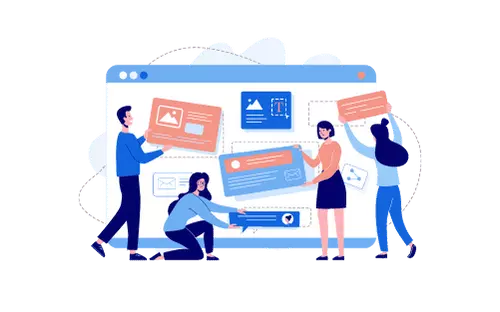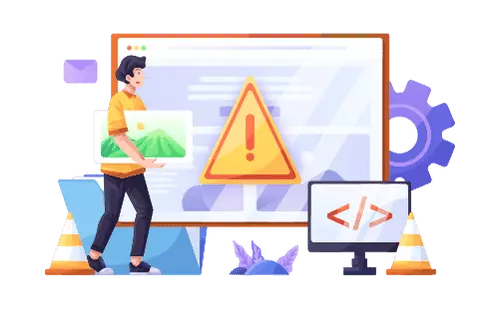Content Management System

A content management system is an application that enables websites to create and update their content without web developers.
The CMS provides a way for website owners and other administrators to add, edit, delete, or move content on the site without contacting programmers.
Many CMSs are available in either open-source or proprietary forms.
Proprietary systems typically cost more but offer greater control and flexibility over the programming and design of your website.
Open-source CMSs tend to be less expensive but lack some proprietary systems' features.
In addition, vendors rarely support open-source CMSs with training on how they work in detail.
What is a content management system?

A content management system is an application that enables websites to create and update their content without web developers.
The CMS provides a way for website owners and other administrators to add, edit, delete, or move content on the site without contacting programmers.
Many CMSs are available in either open-source or proprietary forms.
Proprietary systems typically cost more but offer greater control and flexibility over the programming and design of your website.
Open-source CMSs tend to be less expensive but lack some proprietary systems' features.
In addition, vendors rarely support open-source CMSs with training on how they work in detail.
Content management systems that allow for a free form of customization known as templates can be used to create various combinations of layout and features, allowing you to create unique websites with fewer resources than it would take to develop your own custom CMS.
Open-source vs. Proprietary CMSs
- Open-source CMSs offer more flexibility and control over the programming and design of websites.
- They are less expensive but lack some features that proprietary systems offer.
- In addition, vendors rarely support open-source CMSs with training on how they work in detail.
- Proprietary content management systems cost more but offer greater control and flexibility over the programming and design of your website.
- They provide features that open-source models don't have, including support from a vendor and training from experts.
Benefits of using a CMS

One of the benefits of using a CMS is that you can easily update and maintain your website.
Updates to the CMS are quickly applied to all of the websites that use it.
It also cuts down on time for website administrators because they don't have to update their website's code manually.
Another benefit is updating your website without having to contact a web designer or developer.
You'll need access to a computer with an internet connection and some knowledge about how coding works, making it easy for people with less technical experience to manage their site.
Also, many CMSs will allow you to choose whether or not you want features like widgets, ads, and tracking code in your site so that you can customize your website without compromising on functionality.
Drawbacks of using a CMS
Not all CMSs are built the same, and some are better suited for certain purposes.
If you're looking to build your website, a CMS like WordPress or Drupal might be the best fit.
If you're hoping to use a content management system as your company's online portal, an open-source option like Joomla may be more suitable than proprietary systems.
It is important to consider what type of CMS is right for you and how much control you want over it.
Tips for choosing a CMS.
Before choosing a CMS, first, consider the size of your website.
Are you just starting and need something simple to get up and run?
If so, you might be better off sticking with an open-source CMS. On the other hand, if you have a large site with complex needs, a proprietary system might be worth looking into.
However, it is important to take the time to learn about the system before committing to it.
This can be done by talking to different people who already have experience with that type of CMS or reading reviews.
You also want to consider whether or not you will be able to update your site yourself in the future if needed.
If that is not a concern for you, then an open-source CMS may be more appropriate, so you don't pay for support in the long run.
Select the right type of CMS for your website.
It's a good idea to use multiple CMSs on one website.
If a certain CMS isn't working well for your website, you can swap it out for another type that is working better.
This allows you to choose the appropriate CMS for your needs and allows you to test different CMSs before settling on one.
A content management system is an application that enables websites to create and update their content without web developers.
The CMS provides a way for website owners and other administrators to add, edit, delete, or move content on the site without contacting programmers.
Many CMSs are available in either open-source or proprietary forms.
Proprietary systems typically cost more but offer greater control and flexibility over the programming and design of your website.
Open-source CMSs tend to be less expensive but lack some proprietary systems' features.
In addition, vendors rarely support open-source CMSs with training on how they work in detail.
Conclusion
With CMSs, you get a website that is easy to maintain, so your business doesn't have to spend time updating it with new features.
However, in exchange for this ease of use, you must give up some control over your website's design and content.
Although CMSs can have many benefits, they can also have drawbacks.
They are not always compatible with every hosting service or software platform, which means you may need to make some adjustments to your website's design and content to make it compatible with the CMS you select.
The other issue with the CMS is that you lose control of your website's design or content completely—you cannot make any changes without consulting a developer or designer first.




